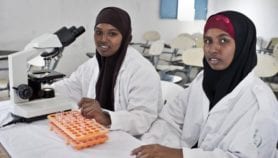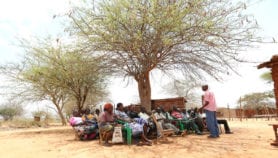By: David Dickson
Send to a friend
The details you provide on this page will not be used to send unsolicited email, and will not be sold to a 3rd party. See privacy policy.
The leaders of the G8 nations, prompted by President Jacques Chirac of France and actively backed by Prime Minister Jean Chrétien of Canada, have endorsed an ‘action plan’ on the use of science and technology to promote sustainable development.
The plan, which was approved on the final day of the three-day G8 summit in Evian, France, will focus in particular on promoting action in three areas: global observation; cleaner, more efficient energy; and agriculture and biodiversity.
The G8 leaders have agreed to set up a high-level group of research officials to promote research collaboration in these fields. And the statement specifies that those G8 leaders whose countries have already ratified the Kyoto Protocol on limiting global warming – a group that excludes the United States – should “reaffirm their determination to see it enter into force”.
The adoption of the action plan follows a commitment made by Chirac at last summer’s World Summit on Sustainable Development (WSSD). At that meeting, Chirac said that there was a need to work with the business sector “to develop systems that spare natural resources and produce little waste and pollution”.
He described the concept of sustainable development as a “fundamental advance”, and said that scientific and technological progress should made to work towards such a goal.
In their statement, the G8 leaders argue that the three areas chosen as the focus of their efforts to promote sustainable development “present great opportunities for progress”. They add that to meet the objectives of the WSSD, “developing countries and countries with economies in transition need to build and strengthen their capacity to assimilate and generate knowledge for sustainable development”.
Co-operative scientific research on transformational technologies “offers potential to improve public health by cutting pollution and reduce greenhouse emissions to address the challenge of global climate change,” the G8 leaders say. “Our countries must optimise the use of natural resources including through recycling.”
Steps to strengthen international co-operation on global observation will include the development of close co-ordination of global observation strategies over the next 10 years, and the production of “reliable data products” on atmosphere, land, fresh water, oceans and ecosystems.
Accelerating the research, development and diffusion of energy technologies will include encouraging the diffusion and uptake of “advanced energy efficient technologies”, promoting “rapid innovation and market introduction of clean technologies” in both developed and developing countries, and “substantially increasing the share of renewable energy sources in global energy use”.
The latter commitment will include stimulating fundamental research in renewable energies, such as solar photovoltaics, off-shore wind energy, next generation wind turbines, wave/tidal, geothermal and biomass. The G8 leaders also promised to accelerate the development of fuel cell and hydrogen technologies.
In making this commitment – and in a tacit acknowledgement of France’s nuclear power programme – the G8 leaders say that they “take note” of those members “who will continue to use nuclear energy to develop more advanced technologies that would be safer, more reliable, and more resistant to diversion and proliferation”.
On agriculture and biodiversity, the leaders promise to support the International Treaty of Plant Genetic Resources for Food and Agriculture “by concluding negotiations over a standard material transfer agreement that facilitates access to plant genetic resources for agricultural research and development and equitable sharing of benefits arising from their use”.
They also say that they will support the “vital role” of the Consultative Group for International Agricultural Research (CGIAR) in disseminating agricultural research, as well as the Global Forum for Agricultural Research and other regional and national agronomic research organisations and North-South and South-South research partnerships;
Finally they promise to promote sustainable agricultural technologies and practices, “including the safe use of biotechnologies” among interested countries, that contribute to preventing famine, enhancing nutrition, improving productivity, conserving water and other natural resources, reducing the application of chemicals, improving human health and preserving biodiversity.
The statement ends by saying that the G8 member countries “will work in partnership with developing countries and relevant multilateral organisations to facilitate utilisation in developing countries of the results of relevant research and development in these technologies”.
In particular, they promise to convene “senior G8 policy and research officials and their research institutions” to compare and to link programmes and priorities in research in the three areas.
They add that this group “should also consider ways to assist developing countries that have their own research programmes in these three areas, inter alia by examining the possibility of opening our research programmes to third countries”.
Link to Science and Technology for Sustainable Development — a G8 Action Plan
© SciDev.Net 2003
More on Networks

Script media release
Journalists offered ‘big break’ mentoring opportunity from Radio Nigeria
03/04/19












